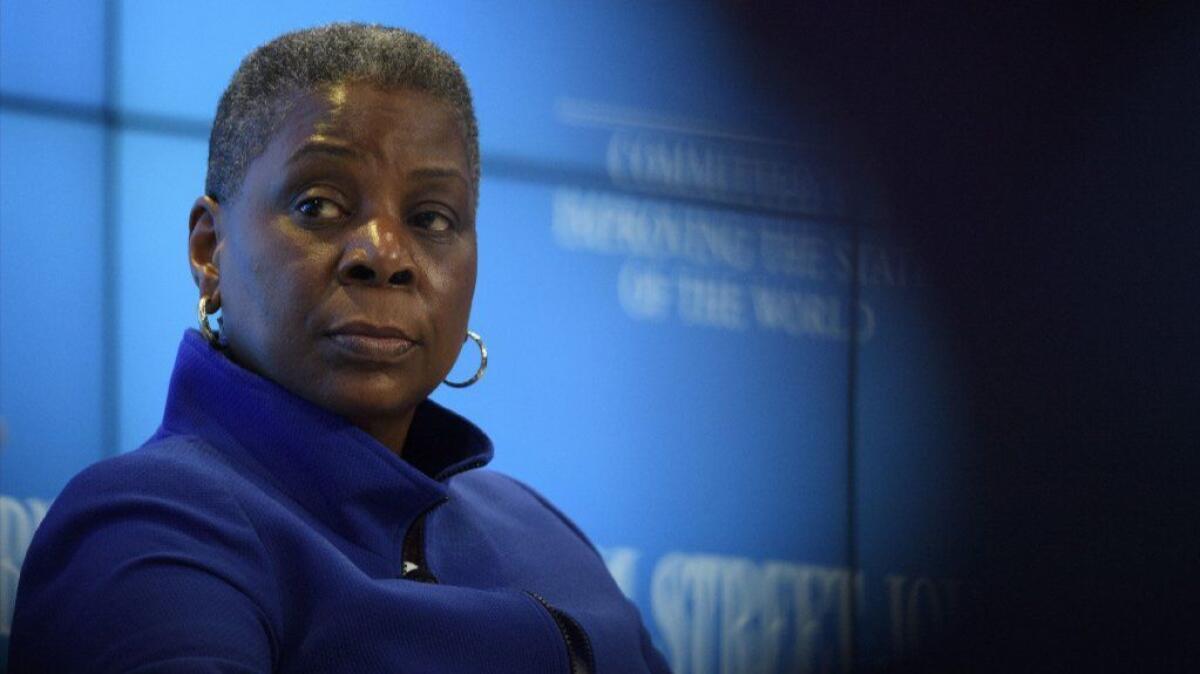Even among Harvard MBAs, few black women ever reach corporate America’s top rungs

- Share via
In recent months, corporate America’s corner office has gotten a little less diverse when it comes to the number of African Americans.
With American Express Chief Executive Kenneth Chenault stepping down, there are just three black CEOs in the Fortune 500. And with the departure of former CEO Ursula Burns from Xerox, announced in 2016, there are no black female CEOs leading companies in the S&P 500 index.
New research featured in the latest issue of Harvard Business Review doesn’t offer much hope that those numbers will improve any time soon. Even among graduates of Harvard Business School — arguably the most elite graduate business program in the country — only 13% of black female Harvard MBAs over the last 40 years have reached the senior-most executive ranks. That’s compared with 40% of non-African-American Harvard MBA degree holders who reach those top ranks.
The analysis, the first of its kind to examine the career paths of Harvard Business School’s black female alumnae, found that 532 African American women graduated from the program between 1977 and 2015, but just 67, or 12.6%, had reached chair, CEO or other C-level executive status. (About 19% of black male graduates had attained similar positions.)
The authors of the report — professors at Georgetown University and Harvard Business School and Morehouse College President David Thomas — interviewed 30 of those women, asking about the skills, attributes and workplace strategies they felt were important for getting ahead.
“It’s ironic — with a group of professionals who have such high credentials,” in terms of graduate and undergraduate degrees and test scores and career ambition, “you would think the odds would be stacked in their favor for success and advancement,” said coauthor and Georgetown University professor Laura Morgan Roberts.
The analysis looks only at the career tracks of men and women with similar advanced, elite degrees. As a result, it’s less likely that educational background or lack of career ambition can explain the disparities in advancement.
“This group is very highly credentialed, and given those particular assumptions, they should rise at the same level,” said Anthony Mayo, a coauthor and professor at Harvard Business School. “There is not an indication there is a drop-off in desire.”
The analysis, which was done in conjunction with the 50th anniversary of the founding of Harvard Business School’s African American Student Union, captures the career trajectories of the majority of female black graduates who have earned degrees from the school. (Lillian Lincoln Lambert, the first black woman to receive a Harvard MBA, graduated in 1969.)
It also helps to bolster other figures that show the particularly low numbers of black women among the top rungs of major businesses. Research by the nonprofit research firm Catalyst, for instance, finds that just 1.3% of executives and senior-level managers in S&P 500 companies are black women. Almost 5% are women of color, and nearly 22% are white women.
One answer that’s almost cliche for many leaders but runs in opposition to conventional wisdom for black women is the need to be authentic on the job.
“Much of the advice that minorities are often given around advancing and succeeding emphasizes the ways in which they may need to conform or assimilate — to see who’s in power and emulate those models of power,” Roberts said. “These women are saying, ‘Look, my secret sauce, or my competitive advantage or my unique valuable resources, will come from the combination of all of the distinctive experiences that I bring.”
Yet they also recognized openly they couldn’t “be themselves” at work with the same nonchalance as their average middle-age white male peer. Instead, they had to pay careful attention to remaining flexible, navigating internal politics and paying attention to the responses of others at all times with a sophisticated emotional intelligence.
If that sounds exhausting, it is. “We heard that,” she said. She pointed to one senior woman they interviewed who is quoted in the article saying, “I’m forever exhausted by people thinking the reason I have the senior role I’m in is that I’m black, not that I’m excellent.”
Their research also found that many of the women had careers characterized by lateral moves and changes in industry or employer to get ahead. They displayed uncommon resilience, were adept at being able to view how others were seeing them, built relationships with managers who advocated on their behalf and worked in organizations that gave them room to slip up.
McGregor writes a column on leadership for the Washington Post.
More to Read
Inside the business of entertainment
The Wide Shot brings you news, analysis and insights on everything from streaming wars to production — and what it all means for the future.
You may occasionally receive promotional content from the Los Angeles Times.










